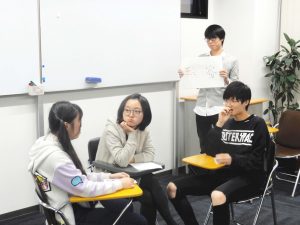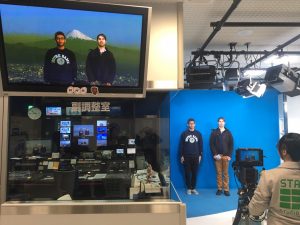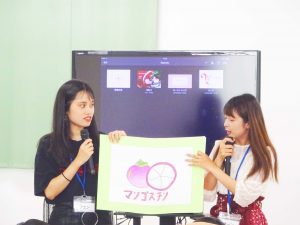
This is the most classic course where, on a student visa, students learn Japanese in a systematic way.
At the moment of their entrance in school, students take a placement test to be able to study in the most suitable class environment.
Through rich classroom activity and subjects, the course aims at providing students with proper knowledge of the language and natural fluency.
For students of intermediate level and up, a program conceived to answer a wide range of learning needs is in place; accessing higher education, finding employment or simply experience Japanese culture are within a hand’s reach.
Students’ voice

Maria (Spainish)
“ARC friends and staff helped me”

Liang (Taiwan)
“Learning how to make presentations was very useful”
Course outlines
Visa type
Student visa
Starting time
April, July, October, January
Check the course calendar HERE.
Available courses
April: 2 years / 1 year
July: 1 year 9 months
October: 1 Year 6 months
January: 1 year 3 months
Enrollment must be consistent with available courses and their duration.
Capacity
20 students per class, on average
Class hours
9:15 to 12:30 / 13:30 to 16:45 (one class period is 45 minutes long, with four periods per day)
The first class is determined through placement test evaluating students’ Japanese proficiency at entrance.
Holidays
Weekends, public holidays, Summer holidays, school breaks and any additional holiday established by the school’s Principal.
Homework and tests
Students get homework every day.
Class content from Monday to Thursday is usually the subject of the Friday achievement tests.
Finals are scheduled at the end of every school term.
Homeroom system
Every class is supervised by one homeroom teacher that performs individual counseling with students for a dedicated follow-up.
Working part-time
It is possible to work part-time after obtaining a special permit denominated “Permission to engage in activity other than that permitted under the status of residence previously granted”.
Students can then work up to 28 hours per week, but cannot be employed in businesses related to adult entertainment.
More on working part-time HERE.
Tuition
Learning targets
| Term | Level | Attainment Target |
|---|---|---|
| 1st | Beginner | Acquire minimum conversation skills in order to live in Japan. |
| 2nd | Elementary | Able to function in daily conversation. Understand basic sen tence patterns and able to express opinions or write sentences. |
| 3rd | Pre-intermediate | |
| 4th | Lower Intermediate | Have no inconveniences in daily conversation. Develop vocab ulary including terminology and acquire enough Japanese language ability to enter technical schools. |
| 5th |
Intermediate |
|
| 6th | ||
| 7th | Advanced | Able to communicate with Japanese people with no difficulty. Acquire enough Japanese language ability to take entrance examinations for universities. |
| 8th | Superior | Able to have a debate almost equivalent to Japanese people on specialized topics and abstract matters. There will be no limits on topics and will freely be able to describe and discuss logically. |
Assessments
Through tests and homework, we evaluate students’ pronunciation, characters knowledge, grammar, listening and reading comprehension and composition abilities on a five-level scale (S> A >B >C> F).
Timetable
Elementary Level
| MON | TUE | WED | THU | FRI | |
|---|---|---|---|---|---|
| 1st period | Pronunciation & characters | Pronunciation & characters | Pronunciation & characters | Pronunciation & characters | Pronunciation & characters・HR |
| 2nd period | Comprehensive Japanese | Comprehensive Japanese | Comprehensive Japanese | Comprehensive Japanese | Achievement test |
| 3rd period | Conversation | ||||
| 4th period |
Intermediate level
| MON | TUE | WED | THU | FRI | |
|---|---|---|---|---|---|
| 1st period | Pronunciation, characters and speed reading | Written expressions | Pronunciation, speed reading | Pronunciation, characters and speed reading |
Pronunciation, Characters + Homeroom Achievement test |
| 2nd period | Listening Comprehension | Reading comprehension |
Comprehensive Japanese |
Class activity evaluation |
|
| 3rd period | Comprehensive Japanese | Comprehensive Japanese | Conversation |
Comprehensive Japanese |
|
| 4th period |
Advanced level
| MON | TUE | WED | THU | FRI | |
|---|---|---|---|---|---|
| 1st period | Pronunciation, written expression | Characters, comprehensive Japanese | Pronunciation, comprehensive Japanese | Characters, speech expressions | Pronunciation, Characters,Homeroom |
| 2nd period | Achievement test | ||||
| 3rd period | Comprehensive Japanese | Optional class (Listening) |
Optional class (Japanese affairs) |
Optional class (Reading) |
Comprehensive Japanese |
| 4th period |
Optional classes

From intermediate level upwards, students can choose their classes depending on their learning goals, interests and passions.
Read more about optional classes
Class activities

Roleplays, interviews, discussions, presentations: a wide selection of activities where students can exchange and confront ideas is offered.
Students learn how to approach a problem from different angles and voice their own opinions.
Japanese affairs

Students are also provided with multiple opportunities to experience Japanese society and culture: the school invites Japanese guests for visitors’ sessions, and every term is animated by school events like Sports Day, field trips, Speech Contest, to help students deepen their understanding of Japan.
Project works

Students discuss ideas and plan activities outside of the school, where they can put to test their Japanese. They then make presentations of what they learned. By using their skills and knowledge to the maximum, students improve their proficiency on the whole.
Textbooks
Elementary – Beginners (example)
Minna no Nihongo Shokyu 1, II Ed.
Minna no Nihongo Shokyu 2, II Ed.
Kana Master
Kanji Master N5
Kanji Master N4
Kanji Master N3
Intermediate – Advanced (example)
For Intermediate learners of Japanese, Japan through my eyes
Comprehensive Japanese Practice through Specific Topics – Upper intermediate (New Ed.)
Comprehensive Japanese Practice through Specific Topics – Advanced (New Ed.)
Images of Japan
Kanji Master N2
Kanji Master N1


